The Bad Seed Blu-ray Movie
HomeThe Bad Seed Blu-ray Movie 
Warner Bros. | 1956 | 129 min | Not rated | Oct 11, 2011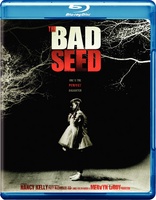
Movie rating
7.3 | / 10 |
Blu-ray rating
| Users | 3.7 | |
| Reviewer | 3.5 | |
| Overall | 3.5 |
Overview
The Bad Seed (1956)
An ideal housewife begins to suspect her loving eight-year-old daughter may be a heartless killer.
Starring: Nancy Kelly (I), Patty McCormack, Henry Jones (I), Eileen Heckart, Evelyn VardenDirector: Mervyn LeRoy
| Horror | Uncertain |
| Thriller | Uncertain |
| Drama | Uncertain |
| Mystery | Uncertain |
Specifications
Video
Video codec: MPEG-4 AVC
Video resolution: 1080p
Aspect ratio: 1.78:1
Original aspect ratio: 1.85:1
Audio
English: DTS-HD Master Audio Mono (48kHz, 24-bit)
BDInfo
Subtitles
English SDH, French, Spanish
Discs
25GB Blu-ray Disc
Single disc (1 BD)
Playback
Region free
Review
Rating summary
| Movie | 4.5 | |
| Video | 3.0 | |
| Audio | 3.0 | |
| Extras | 3.0 | |
| Overall | 3.5 |
The Bad Seed Blu-ray Movie Review
Before There Was Dexter
Reviewed by Michael Reuben October 6, 2011Once upon a time, in a faraway land of sweetness, light and innocence, children were very good and only grown-ups committed crimes, but then a little girl shocked the world by killing people and skipping merrily on her way. No one except weirdly obsessed crime reporters talked about psychopaths or sociopaths, and even the smartest and best informed vehemently resisted the notion that any aspect of such behavior could be the result of neurological chemistry or genetic heritage. Today we watch the film, and think, "Duh!" The experience is akin to Hitchcock's famous example of witnessing two people talk about baseball while there's a bomb counting down below the table. You're yelling at the screen that everyone should get the hell out of there and call the bomb squad.
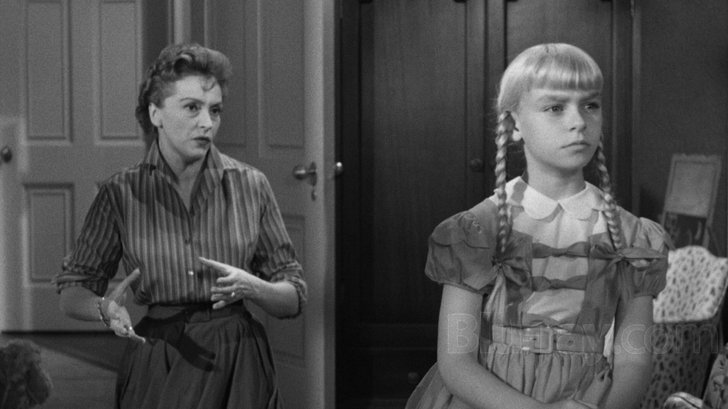
The Bad Seed is plotted with the geometric precision of what used to be called a "well-made play" -- which is appropriate, since it was adapted from a successful Broadway play, which was itself adapted from a best-selling novel. Director and producer Mervyn LeRoy retained the principal Broadway cast and put the film into production quickly enough that Patty McCormack, making her film debut, was still young enough to play the pivotal role of Rhoda Penmark. Christine Penmark (Nancy Kelly) is a housewife and mother married to Col. Kenneth Penmark (William Hopper, familiar to Perry Mason fans as Paul Drake). As becomes evident during the course of the film, the Penmark household has followed the pattern of many army families, moving with the colonel's career. They currently inhabit a charming apartment in an unnamed idyllic town, from which, as the film opens, the colonel has been called away for an extended stay by official duties in Washington. Christine is sad to see him go, but she has been virtually adopted by the landlady who lives upstairs, Monica Breedlove (Evelyn Varden). Mrs. Breedlove insists that the Penmarks' pig-tailed blonde daughter, Rhoda, call her "Aunt Monica". To all outward appearances, Rhoda is the perfect eight-year-old -- maybe too perfect. She wears dresses that remain immaculate (never jeans), curtsies, maintains perfect posture, smiles like a toothpaste ad and recites endearments to her parents like a Hallmark card. Only occasionally does Rhoda's mood darken, and then it's an instant thundercloud. At the moment, Rhoda is displeased (to put it mildly) that she lost the gold penmanship medal to Claude Daigle, another student at the private Fern Grammar School. In Rhoda's eyes, she had the best penmanship, and the medal belongs to her. It isn't long before the Daigle boy is dead, and it isn't long after that before Christine finds the penmanship medal among her daughter's belongings. Revealing these developments can hardly be considered spoilers, because they are so clearly foreshadowed. I'm sure even contemporary viewers saw them coming a mile away, because the audience is shown cracks in Rhoda's facade that no one else sees, though her mother suspects something. (It turns out that Claude Daigle isn't the first person possessed of something Rhoda wanted who died "accidentally" when Rhoda was nearby.) Christine Penmark has other demons. She is tormented by inklings, and even dreams, that she was adopted. She shares these thoughts with her landlady, a devotee of the newly fashionable pursuit of psychoanalysis, who assures her that it's a common childhood fantasy. But when we discover, through Christine's conversations with Reggie Tasker (Gage Clark), a guest speaker at the landlady's psychoanalysis "club", that Christine's famous reporter father covered the notorious case of a serial killer named Bessie Denker, it's not hard to guess what the "bad seed" of the title refers to. Sure enough, after the Daigle boy's death, Christine's father (Paul Fixx) responds to her summons, and she forces the truth out of him about her birth parents. (It would have been the 1920s, a time when adoptions were far less subject to official oversight than now.) Still, the great man insists that such tendencies can't be inherited and rests his certainty on every enlightened and respectable medical professional in the business. In what is perhaps an unintentional irony, an eminent surgeon who appears later in the film is shown lighting up a cigarette. Maybe there was some amount of "oh no, it can't be!" mystery to The Bad Seed when it premiered in 1956, but I doubt it. The film is all about the audience understanding exactly what's at stake in conversation after conversation where the particpants are fencing with each other in a highly ritualized fashion, usually with one or more parties desperate to conceal something. Nancy Kelly won a Tony on Broadway, and was nominated for an Oscar, for her multi-layered portrayal of a mother who first suspects, then knows, that her daughter is a monster, yet can't bring herself to stop loving and protecting her, even when faced with the spectacle of another mother's unimaginable loss and pain. Her confrontations with Claude Daigle's mother (Eileen Heckart in her first major screen role) are precisely coordinated duets of accusation and restraint, even when, as usual, other people are in the room (Heckart, too, was nominated). A different kind of duet plays out between Kelly's Christine and Joan Croydon's Claudia Fern, who, as Mrs. Daigle rightly suspects, wants above all to protect the reputation of her school. The deft indirection with which Miss Fern indicts Rhoda in Claude's death, without ever saying an unkind word, is a classic demonstration of the formalities of a bygone age. In the end, Miss Fern gets Christine to declare that Rhoda won't be returning to the Fern School, only to announce that they've already decided not to invite her back. But the film's most famous pas de deux is between Rhoda herself and Mrs. Breedlove's handyman, Leroy (Henry Jones), who today would probably be referred to as "mentally challenged". Though an adult, he behaves like a child, and for that reason he sees Rhoda as the mean little girl that she is. Unfortunately, that's all Leroy sees, and he doesn't realize that the taunts and tall tales he throws her way are more than just playground horseplay until it's too late. The Hays Code that preceded the MPAA rating system required that the ending be changed from the book and the play, but it hardly matters. Whichever Penmarks do or don't survive, it isn't a pretty picture.
The Bad Seed Blu-ray Movie, Video Quality 
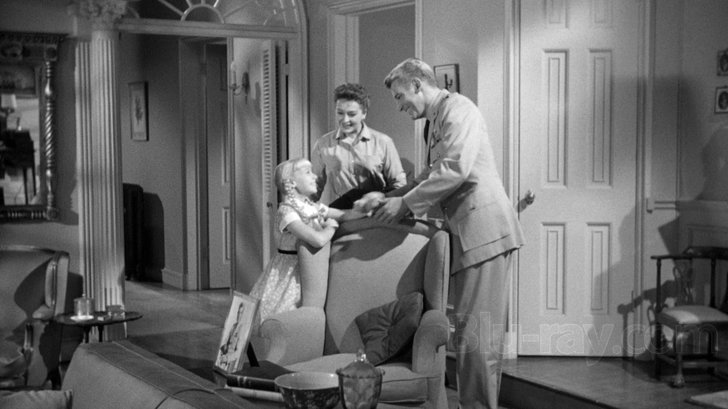
Let's start with the aspect ratio question. Warner's 2004 DVD and the previous laserdisc release presented The Bad Seed in the Academy ratio of 1.37:1, and the Blu-ray presents it at 1.78:1 (and not 1.85:1, as advertised on the case, though the difference is hardly meaningful). Which is correct? Historical analysis gives the nod to the Blu-ray. Although the camera negative was undoubtedly shot in the Academy ratio (and apparently "protected" from intrusion by microphones and cables), by 1956 most, if not all, movie theaters had converted to widescreen exhibition. Except perhaps in a few antiquated venues, the film would have been shown at 1.85:1, which makes the Blu-ray AR correct. Certainly at no point during my viewing did I feel that the image was in any way cramped or inappropriately cropped. As for the quality of the 1080p, AVC-encoded image, there the news is less upbeat. Certainly the image is natural and film-like, with a grain structure that does not appear to have been artificially stripped away, digitally frozen or otherwise manipulated in an inappropriate way. Black levels are solid, and I saw no compression or other digital artifacts. So what's the problem? Well, on a 72" screen from 10' away, this was one of the least detailed images I've seen on a Blu-ray. Anyone familiar with my previous reviews should know that I don't need to see "pop" or razor-edged sharpness, and that I'm perfectly comfortable with a soft image. But the image on The Bad Seed goes beyond "soft" into the realm of indistinct. Details of faces, clothing, furnishings, the Penmark backyard or the set of the Fern School picnic that one would expect to see captured on a 35mm film negative and reproduced on a Blu-ray just don't come through. Without more information about the source, I can't say whether this accurately reflects LeRoy's intent, a transfer issue, or, possibly, the use of an element that was too many generations removed from the original camera negative. But it caught my attention sufficiently to merit comment.
The Bad Seed Blu-ray Movie, Audio Quality 
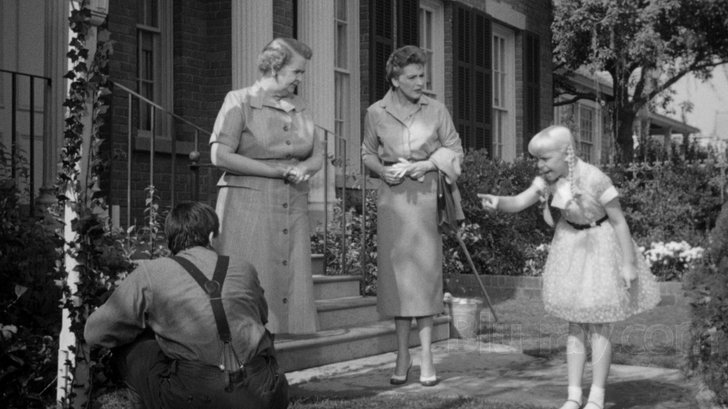
The sound is mono presented in DTS lossless, and the fidelity is acceptable, if not superb. Alex North's score sounds somewhat muddy and compressed at the high end, and there's very little bass, but the dialogue is clearly rendered (though not always naturally).
The Bad Seed Blu-ray Movie, Special Features and Extras 
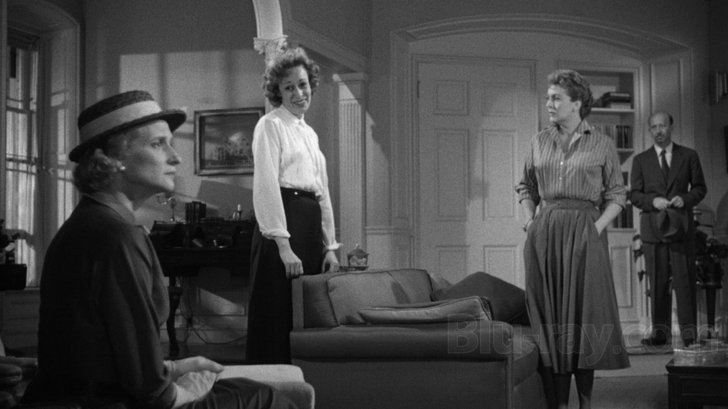
The extras have been ported over from the 2004 DVD.
- Commentary with Actress Patty McCormack and Interviewer Charles Busch: Busch is an actor (primarily in theater) and playwright whose love of films from this era is legendary and have inspired much of his own work. He interviews McCormack in depth about her work on the film. If there's a downside to having such an unabashed fan serve as interviewer, it's that he frequently digresses into Hollywood trivia (e.g., William Hopper, who played McCormack's father, was the son of legendary gossip columnist Hedda Hopper; did McCormack ever meet her?). But the enthusiasm is so genuine that it becomes infectious.
- Enfant Terrible: A Conversation with Patty McCormack (SD; 1.33:1; 15:10): In a lively and engaging interview, McCormack covers many of the highlights of the commentary, starting from getting the role in the play through making the film and her subsequent career.
- Theatrical Trailer (SD; 1.33:1; 3:20): Whatever you do, don't reveal the ending!!!
The Bad Seed Blu-ray Movie, Overall Score and Recommendation 
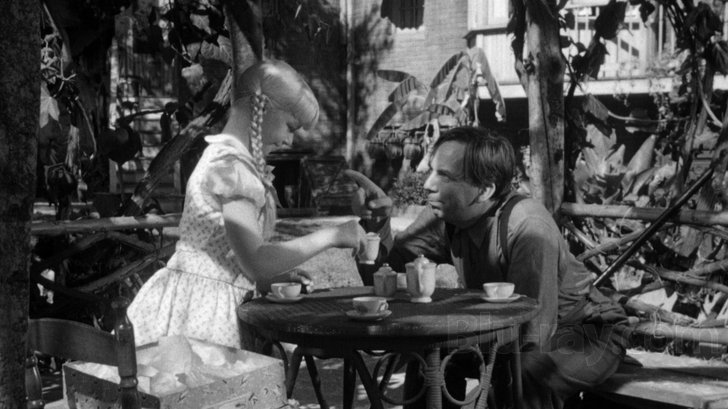
For some contemporary tastes, The Bad Seed may seem like a filmed play, but it isn't. LeRoy picked his camera placements carefully to define the shifting relations of characters to one another, and his expressive use of close-ups creates an uncomfortable intimacy that only film can provide. Harold Rosson's shadowy black-and-white camerawork (also Oscar-nominated) transformed the story into something that could almost be called "suburban noir", with a pint-sized femme fatale. Yes, it's a film primarily composed of talk, and the talk is highly stylized, but people were more formal then, and writing was better; the screenwriter, John Lee Mahin, kept much of playwright Maxwell Anderson's original dialogue, and Anderson was a major American author. For those willing to accept it on its own terms, The Bad Seed is highly recommended as a film and, for reasons noted above, recommended on a qualified basis as a Blu-ray.
Similar titles
Similar titles you might also like

The Stepfather 4K
Collector's Edition
1987

Proxy
2013

Monstrous
2022

Marrowbone
The Secret of Marrowbone
2017

Wolf Creek
2016

Ghostkeeper
1981

The Loved Ones
2009

Halloween
Unrated Collector's Edition
2007

Halloween 4K
2018

The Twilight Zone: Season One
2019

Lifechanger
2018

What Keeps You Alive
2018

Bad Samaritan
2018

Demons of the Mind
Blood Evil / Blood Will Have Blood / Nightmare of Terror
1971

Clown
2014

Wolf Creek 2
Uncut
2013

American Mary
2012

The Woman
2011

Isle of the Dead
Warner Archive Collection
1945

The Uninvited
2009